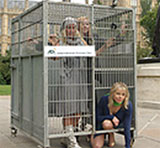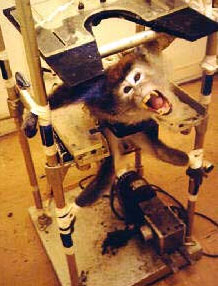
Welcome to the ezine produced by SGI Buddhists that prompts the positive, kindles the constructive, highlights the hopeful and leaves you feeling - well, up!

 I recently squeezed into a small barren metal cage to raise awareness for Primate Day, writes Julia Stephenson.
I recently squeezed into a small barren metal cage to raise awareness for Primate Day, writes Julia Stephenson.
I was with animal welfare campaigner Meg Matthews and singer-songwriter Maria Daines, whose fantastic song 'Monkey in a Cage' recently made it to the top of the charts. Horrifically, monkeys and apes are still used in animal experiments despite a ban that is supported by doctors, scientists- including the RSPCA and primatologist Dr Jane Goodall - researchers and 200 welfare groups worldwide.
Used as I am to Green Party photo-calls when frequently no one turns up, it came as a shock to be confronted with about twenty snappers, lured by Meg Matthews. As the ex-wife of supergroup Oasis founder member, Noel Gallagher, she's a paparazzi pulling celeb - and very nice she is, too.
But my goodness, the snapping went on for ages - we were photographed getting into the cage, climbing out of it, on top of it, outside it, under it and pushing it while smiling, looking sad and angrily banging on the bars. Eventually the clicking stopped and we could climb out and all go home.
But many animals are not so lucky.
 Humans are only locked up for life when they have committed some heinous crime but this doesn't apply to animals. Dolphins cruelly captured from the oceans and transported to tiny oceanariums to perform stupid tricks for stupid spectators, wild birds netted and caged, and the thousands of monkeys captured in jungles and locked up in cages have committed no crime yet must suffer a life of agonising, often solitary, confinement.
Humans are only locked up for life when they have committed some heinous crime but this doesn't apply to animals. Dolphins cruelly captured from the oceans and transported to tiny oceanariums to perform stupid tricks for stupid spectators, wild birds netted and caged, and the thousands of monkeys captured in jungles and locked up in cages have committed no crime yet must suffer a life of agonising, often solitary, confinement.
The British Union for the Abolition of Vivisection do a great job drawing attention to the plight of laboratory animals. It's not a fashionable cause and is something we'd prefer not to have to think about - but we must.
We don't need to capture wild primates then destroy them in labs. While there are similarities between us and primates there are also key biological differences which make primate research unreliable.
Recently this was demonstrated in the TGN1412 experimental drug trial that nearly killed six young men at Northwick Park hospital when they were given a drug which had been 'proved safe in monkeys'.
Testing on animals slows down medical progress because it tells us about animals, not people. Animals react differently to many substances. Aspirin, for example, is safe for people, but can be fatal to cats; penicillin can kill guinea pigs; arsenic is dangerous for humans but not for rats, mice or sheep; insulin is safe for humans yet can produce deformities in mice, rabbits and chickens. Thalidomide was tested on animals but cripples humans.
Given this misleading data it's no surprise that prescription drugs tested on animals are the fourth highest cause of death in the western world.
It's not just tree huggers like me who are coming out against animal experiments. Many scientists and doctors are against them because they believe that they are plain bad science. Thousands of them have joined Europeans for Medical Progress, an independent body that opposes animal experimentation solely because it harms people. These are hard-headed professionals brave enough to stick their head over the parapet and say patients are dying due to reliance on misleading animal tests.

Director Dr Kathy Archibald admits those who speak out risk professional suicide and ostracism from the medical establishment but they feel compelled to fight for the truth.
There is now overwhelming evidence that animal experiments can prove misleading or fatal to humans, that they exhaust precious research funding, waste valuable time, produce ineffective solutions and delay progress toward human cures.
Dr Michael Coleman, Senior Lecturer in Toxicology at Aston University, notes, 'As well as the ethical considerations, scientifically, primates are simply not close enough to us to act as good experimental models and we should be promoting replacement of animal work with human-cellular systems. We must leave behind the intellectual laziness of relying on animal models and invest in human-cellular based alternatives for the future.'
Many animal experiments are bewilderingly pointless. At Columbia University lead pipes are surgically implanted into the skulls of monkeys to study the connection between stress and menstrual cycles. Very few women have large weights surgically attached to their skulls, but they do suffer from other types of stress - perhaps the realisation that their taxes are wasted on ridiculous experiments like this.
It seems that any development which purports to 'help' humans is 'progress', even if it comes from HG Wells's island of Dr Moreau.
Unfortunately, the focus continues to be on a tiny minority of violent extremists at the expense of rational debate. In reality the majority of animal rights protesters are compassionate and law-abiding. The suffragette movement and the fights against apartheid and slavery all had their share of violent extremism but this does not detract from the essential justice of their arguments.
Ironically, we can't avoid television programmes about people being operated on, while programmes depicting animal experiments are considered too horrific to stomach.
This squeamishness means experiments are performed in gulag-type establishments hidden from public gaze. If the conditions are really as acceptable as supporters insist why the secrecy? It's time to open up these barbaric places to television cameras, let the public know what goes on in them and start a rational debate – preferably not financed by pharmaceutical companies or others with a vested interest in perpetuating this iniquitous system, as is currently the case.
The tragic thing is while we humans bicker and pharmaceutical companies line their pockets, in laboratories all over the world animals are suffering unimaginably agonising deaths when there are already far more effective testing methods available.
Gandhi said 'The greatness of a nation and its moral progress can be judged by the way in which its animals are treated.' Let's prove the greatness of all our nations and end this cruelty now.



